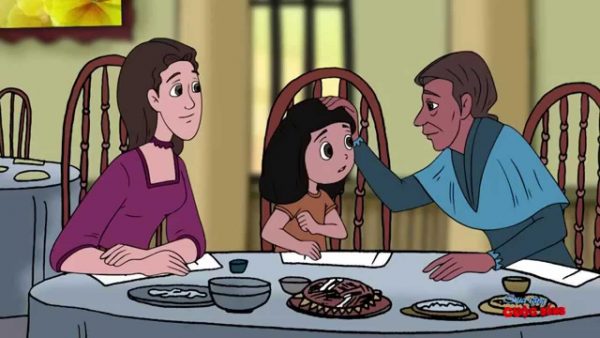Gratitude is a virtue that expresses the quality and ethics of a person in daily interactions with the society. Maintaining a sense of gratitude will make our lives more humane. Looking back on history, gratitude has always been a moral tradition in communications. The proverb “drink water, but remember the source” passed on by the forefathers has taught today’s generations about the need to maintain gratitude in every human being.

Good family traditions help form good personality in children
In light of this, today’s young generation in general and students in particular need to create a moral habit of showing gratitude to the society. We have come to realize that in this world, apart from the parents who gave birth and raised us, we owe a lot to the other people who have created and maintained the conditions for us to live our lives. The hard-working farmer gives us rice, the school gives us knowledge, the worker weaves the fabrics so that we can make clothes, the builder gives us our houses, and the martyr sacrificed his blood and life to bring us independence and freedom. We need help and guidance even in the smallest things, for example, we ask for street directions when we get lost. Different people with different jobs and occupations in the society have used their wisdom, energy, and enthusiasm to create spiritual and material wealth to provide us with comfortable and happy lives. Ask yourself again, how could we be indifferent to their merits?

Teaching children about gratitude
By having a heart full of gratefulness to the surrounding people, our students will express a beautiful way of life where they know how to uphold and respect others and behave in a civilized and polite manner. This is also a manifestation of humility, courtesy, and rationality in an educated and civilized person that every student needs to have. Schools are doing a very meaningful work as they launch a movement of modern lifestyle with the strategic teaching “First is obedient, second is knowledge” which is very helpful to the formation of the habit of showing gratitude in students. Once this quality becomes a cultural trait in speaking, behaving, and communicating, students will genuinely have a beautiful way of life. The words “thank you” and “I’m sorry” said by the youth with a courteous attitude will help create an impression of fondness with others and make parents and teachers feel happy and proud. By feeling grateful towards other people, students will learn to be more sincere, to observe the world with cheerfulness in their eyes, and to feel more respectful to working people. The negative expressions of an indifferent, selfish, and neglected lifestyle of students will gradually cease, giving way to a civilized and beautiful way of life.
To be able to form a moral habit of showing gratitude to other people, each student must practice daily to turn these good qualities into their own way of thinking. Families and teachers also play very important roles in shaping, reminding, fostering, and educating children to form a moral habit of showing gratitude to ensure each student has a healthy mind, a love for life, and a meaningful and happy life in the human world.
Cu Tran

